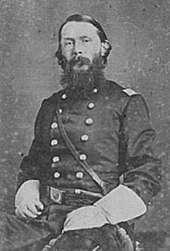William Haines Lytle
William Haines Lytle (born November 2, 1826 in Cincinnati , † September 20, 1863 in Chickamauga Creek ) was a politician, poet and officer in the United States Army from Ohio . He served in the Army during the Mexican-American War and the Civil War, and died in combat during the latter.
Life
Lytle was born in Cincinnati as a descendant of the Lytle family. He graduated from the University of Cincinnati with a law degree . After completing the exam, he started a law firm in his hometown, but Lytle joined the 2nd Ohio Volunteer Infantry and served as a captain in the Mexican-American War . After his return from Mexico, he re-established and expanded his law firm. As a member of the Democrats , he was elected to the Ohio House of Representatives. In 1857 he ran for the post of lieutenant governor , but lost by a few hundred votes. In the same year he published the poem "Antony and Cleopatra", which found numerous readers in both the northern and southern states. Lytle was named major general in the Ohio Forces shortly thereafter . In 1860 he ran unsuccessfully for the Democratic nomination for a seat in the United States House of Representatives . He also supported the unsuccessful candidacy of Stephen A. Douglas in the 1860 presidential election .
When the Civil War broke out in 1861, thanks to his political and military ties, Lytle was named Colonel of the 10th Ohio Infantry . He and the brigade were sent to West Virginia (then still Virginia ), where they took part in several small skirmishes in a campaign that was to lead to the withdrawal of Confederate troops in that region. Lytle himself was given command of the infantry brigade . He was seriously injured in the left calf muscle during fighting in the Kanawha Valley on September 10, 1861, and was released from duty in order to recover. After a four month hiatus, he was assigned as the commander of the military training camp at Bardstown , Kentucky . When he returned to the battlefield, he lead a brigade was in the Division of Ormsby M. Mitchel transferred and assumed Mitchel's operations on the Memphis and Chattanooga Railroad part. On October 8, 1862, he was wounded and captured in the Battle of Perryville . Shortly afterwards it was exchanged and rejoined the army. On November 29, 1862 he was promoted to Brigadier General of the Volunteers and led his brigade in numerous battles in the army of William S. Rosecrans . Officers of the 10th Ohio Infantry awarded him a jeweled Maltese Cross in September 1863 .
death
Just eleven days later he died in the Battle of Chickamauga when he led a counterattack on horseback. Since his identity was known to several respectful Confederates, they placed guards around his body.
The shooter was never known, all that is known to date is that he was a Confederate and used a Whitworth .45 caliber percussion rifle.
His funeral was held at Christ Church Cathedral in Cincinnati early one afternoon . Numerous people lined the streets of the city, so the funeral procession did not reach Spring Grove Cemetery until dusk. His tomb, which is considered to be one of the most impressive in the cemetery, is near the entrance. Lytle never married and left no direct descendants.
Honors
The hill where he died is now in the Chickamauga and Chattanooga National Military Park and is known as Lyttle Hill . The former Fort Vinegar on Vinegar Hill was renamed Fort Lytle after his death . On December 5, 1984, it was added to the National Register of Historic Places .
The Historic District Lytle Park and One Lytle Place in Cincinnati, as well as Lytle Street, are either named after him or his family.
See also
literature
- Ruth C. Carter: For Honor, Glory & Union: The Mexican & Civil War Letters of Brig. Gen. William Haines Lytle. University Press of Kentucky, Lexington 1999, ISBN 0-8131-2108-6 .
- William H. Venable: Poems of William Haines Lyttle . The Robert Clarke Company , Cincinnati 1894, p. 149 ( google.com ).
Web links
- William Haines Lytle in the Find a Grave database . Retrieved October 13, 2018.
- Civil War Poetry: Antony and Cleopatra
- Pictures of William Haines Lytle. Generals and Brevets, archived from the original on January 31, 2008 ; accessed on October 13, 2018 (English).
Individual evidence
| personal data | |
|---|---|
| SURNAME | Lytle, William Haines |
| BRIEF DESCRIPTION | American politician, poet, and officer |
| DATE OF BIRTH | November 2, 1826 |
| PLACE OF BIRTH | Cincinnati |
| DATE OF DEATH | September 20, 1863 |
| Place of death | Chickamauga Creek |
